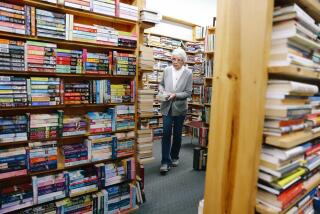Vendors See Hussein as Author of Attack
- Share via
BAGHDAD — On dusty Mutanabi Street, the heart of Iraq’s meager book trade, there was no doubt Friday who was behind the blast that destroyed dozens of shops.
It had to be the man who hated books: Saddam Hussein.
This noted street of bookstalls and Iraqi intellectual life was torn apart Thursday evening when an explosion demolished a 75-year-old building and severely damaged another building across the street. One man, a tea seller, was killed.
Smoke still poured from the ruins Friday as shopkeepers tried to salvage a few possessions from the rubble and a demolition crew began knocking apart the remains of the three-story building.
Authorities say they do not know what caused the blast. Initial speculation focused on the possibility that a propane tank had exploded in one of the shops.
But for the shopkeepers and vendors who survived decades of repression, there was no need for evidence to know who was behind the explosion. It was a rocket fired by those who would bring Hussein back to power.
“They chose this target to instill fear,” said Falah Mahdi, a printer whose shop was damaged. “These people are completely against culture.”
Mutanabi is an unassuming blocklong street of run-down shops in the heart of Baghdad where dozens of vendors lay out books on sheets of cardboard and plywood.
Although the Hussein regime strictly regulated the kind of books the vendors could sell, Mutanabi was an oasis where intellectuals could meet and exchange ideas. Book lovers who were down on their luck could sell some of their volumes for cash or trade others for ones they hadn’t read.
These days, the historic street reflects the changes taking place throughout the country: People are free to express new ideas, but the surroundings are as shabby as ever.
Items for sale include books by some of Iraq’s increasingly powerful Islamic leaders and Western magazines such as Newsweek and GQ that would never have been allowed under Hussein. Also available are manuals for operating computers and used books in English, ranging from William Shakespeare to Stephen King.
The explosion took place about 6:30 p.m., after the vendors had packed up their wares and closed for the day.
Some witnesses said they saw rockets strike the building, but their accounts were contradictory. One said he saw a single rocket coming from the east and heard its whoosh just before it struck. Another said he saw the building hit by two rockets fired from the west.
Bombings and mortar attacks occur often in Baghdad, but assaults using rockets are not as common. Resistance fighters possessing them would be most likely to use them on a valuable military target.
Still, no one on the street had an explanation they felt made more sense. Shopkeepers dismissed reports that the blast might have been caused by a gas cylinder, saying there were none in the building.
Whatever the cause, the explosion started a fire that rapidly engulfed the structure across the street. In addition to the tea vendor who was killed, at least one person was reported injured.
Yihya Mohammed Rasoul, 56, said he lost the stationery shop where he had worked since his father opened it 43 years ago.
“This is a tragedy for me,” he said. “I lost everything. Saddam’s supporters did it. It was to create a mess between people and to create fear inside people.”
Shaalan Zaidan, 40, who has been selling and trading books on the street for a decade, agreed. The explosion, he said, was part of an effort by Hussein’s followers to return him to power and to intimidate the intellectual community one more time.
“Saddam is the true enemy of books,” said Zaidan, who educated himself by reading Shakespeare and Thomas Hardy. “He is against those who love books, who love poetry, who love culture. He is anti-human. Books to me are life.”
More to Read
Sign up for Essential California
The most important California stories and recommendations in your inbox every morning.
You may occasionally receive promotional content from the Los Angeles Times.













